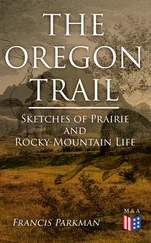Francis Parkman - Tte Oegon Trail
Здесь есть возможность читать онлайн «Francis Parkman - Tte Oegon Trail» весь текст электронной книги совершенно бесплатно (целиком полную версию без сокращений). В некоторых случаях можно слушать аудио, скачать через торрент в формате fb2 и присутствует краткое содержание. Жанр: Приключения про индейцев, Историческая проза, Прочая документальная литература, на английском языке. Описание произведения, (предисловие) а так же отзывы посетителей доступны на портале библиотеки ЛибКат.
- Название:Tte Oegon Trail
- Автор:
- Жанр:
- Год:неизвестен
- ISBN:нет данных
- Рейтинг книги:5 / 5. Голосов: 1
-
Избранное:Добавить в избранное
- Отзывы:
-
Ваша оценка:
- 100
- 1
- 2
- 3
- 4
- 5
Tte Oegon Trail: краткое содержание, описание и аннотация
Предлагаем к чтению аннотацию, описание, краткое содержание или предисловие (зависит от того, что написал сам автор книги «Tte Oegon Trail»). Если вы не нашли необходимую информацию о книге — напишите в комментариях, мы постараемся отыскать её.
Tte Oegon Trail — читать онлайн бесплатно полную книгу (весь текст) целиком
Ниже представлен текст книги, разбитый по страницам. Система сохранения места последней прочитанной страницы, позволяет с удобством читать онлайн бесплатно книгу «Tte Oegon Trail», без необходимости каждый раз заново искать на чём Вы остановились. Поставьте закладку, и сможете в любой момент перейти на страницу, на которой закончили чтение.
Интервал:
Закладка:
Tete Rouge had a mortal antipathy to danger, but on a foraging expedition one evening, he achieved an adventure more perilous than had yet befallen any man in the party. The night after we left the Ridge-path we encamped close to the river. At sunset we saw a train of wagons encamping on the trail about three miles off; and though we saw them distinctly, our little cart, as it afterward proved, entirely escaped their view. For some days Tete Rouge had been longing eagerly after a dram of whisky. So, resolving to improve the present opportunity, he mounted his horse James, slung his canteen over his shoulder, and set forth in search of his favorite liquor. Some hours passed without his returning. We thought that he was lost, or perhaps that some stray Indian had snapped him up. While the rest fell asleep I remained on guard. Late at night a tremulous voice saluted me from the darkness, and Tete Rouge and James soon became visible, advancing toward the camp. Tete Rouge was in much agitation and big with some important tidings. Sitting down on the shaft of the cart, he told the following story:
When he left the camp he had no idea, he said, how late it was. By the time he approached the wagoners it was perfectly dark; and as he saw them all sitting around their fires within the circle of wagons, their guns laid by their sides, he thought he might as well give warning of his approach, in order to prevent a disagreeable mistake. Raising his voice to the highest pitch, he screamed out in prolonged accents, "Camp, ahoy!" This eccentric salutation produced anything but the desired result. Hearing such hideous sounds proceeding from the outer darkness, the wagoners thought that the whole Pawnee nation were about to break in and take their scalps. Up they sprang staring with terror. Each man snatched his gun; some stood behind the wagons; some threw themselves flat on the ground, and in an instant twenty cocked muskets were leveled full at the horrified Tete Rouge, who just then began to be visible through the darkness.
"Thar they come," cried the master wagoner, "fire, fire! shoot that feller."
"No, no!" screamed Tete Rouge, in an ecstasy of fright; "don't fire, don't! I'm a friend, I'm an American citizen!"
"You're a friend, be you?" cried a gruff voice from the wagons; "then what are you yelling out thar for, like a wild Injun. Come along up here if you're a man."
"Keep your guns p'inted at him," added the master wagoner, "maybe he's a decoy, like."
Tete Rouge in utter bewilderment made his approach, with the gaping muzzles of the muskets still before his eyes. He succeeded at last in explaining his character and situation, and the Missourians admitted him into camp. He got no whisky; but as he represented himself as a great invalid, and suffering much from coarse fare, they made up a contribution for him of rice, biscuit, and sugar from their own rations.
In the morning at breakfast, Tete Rouge once more related this story. We hardly knew how much of it to believe, though after some cross- questioning we failed to discover any flaw in the narrative. Passing by the wagoner's camp, they confirmed Tete Rouge's account in every particular.
"I wouldn't have been in that feller's place," said one of them, "for the biggest heap of money in Missouri."
To Tete Rouge's great wrath they expressed a firm conviction that he was crazy. We left them after giving them the advice not to trouble themselves about war-whoops in future, since they would be apt to feel an Indian's arrow before they heard his voice.
A day or two after, we had an adventure of another sort with a party of wagoners. Henry and I rode forward to hunt. After that day there was no probability that we should meet with buffalo, and we were anxious to kill one for the sake of fresh meat. They were so wild that we hunted all the morning in vain, but at noon as we approached Cow Creek we saw a large band feeding near its margin. Cow Creek is densely lined with trees which intercept the view beyond, and it runs, as we afterward found, at the bottom of a deep trench. We approached by riding along the bottom of a ravine. When we were near enough, I held the horses while Henry crept toward the buffalo. I saw him take his seat within shooting distance, prepare his rifle, and look about to select his victim. The death of a fat cow was certain, when suddenly a great smoke arose from the bed of the Creek with a rattling volley of musketry. A score of long-legged Missourians leaped out from among the trees and ran after the buffalo, who one and all took to their heels and vanished. These fellows had crawled up the bed of the Creek to within a hundred yards of the buffalo. Never was there a fairer chance for a shot. They were good marksmen; all cracked away at once, and yet not a buffalo fell. In fact, the animal is so tenacious of life that it requires no little knowledge of anatomy to kill it, and it is very seldom that a novice succeeds in his first attempt at approaching. The balked Missourians were excessively mortified, especially when Henry told them if they had kept quiet he would have killed meat enough in ten minutes to feed their whole party. Our friends, who were at no great distance, hearing such a formidable fusillade, thought the Indians had fired the volley for our benefit. Shaw came galloping on to reconnoiter and learn if we were yet in the land of the living.
At Cow Creek we found the very welcome novelty of ripe grapes and plums, which grew there in abundance. At the Little Arkansas, not much farther on, we saw the last buffalo, a miserable old bull, roaming over the prairie alone and melancholy.
From this time forward the character of the country was changing every day. We had left behind us the great arid deserts, meagerly covered by the tufted buffalo grass, with its pale green hue, and its short shriveled blades. The plains before us were carpeted with rich and verdant herbage sprinkled with flowers. In place of buffalo we found plenty of prairie hens, and we bagged them by dozens without leaving the trail. In three or four days we saw before us the broad woods and the emerald meadows of Council Grove, a scene of striking luxuriance and beauty. It seemed like a new sensation as we rode beneath the resounding archs of these noble woods. The trees were ash, oak, elm, maple, and hickory, their mighty limbs deeply overshadowing the path, while enormous grape vines were entwined among them, purple with fruit. The shouts of our scattered party, and now and then a report of a rifle, rang amid the breathing stillness of the forest. We rode forth again with regret into the broad light of the open prairie. Little more than a hundred miles now separated us from the frontier settlements. The whole intervening country was a succession of verdant prairies, rising in broad swells and relieved by trees clustering like an oasis around some spring, or following the course of a stream along some fertile hollow. These are the prairies of the poet and the novelist. We had left danger behind us. Nothing was to be feared from the Indians of this region, the Sacs and Foxes, the Kansas and the Osages. We had met with signal good fortune. Although for five months we had been traveling with an insufficient force through a country where we were at any moment liable to depredation, not a single animal had been stolen from us, and our only loss had been one old mule bitten to death by a rattlesnake. Three weeks after we reached the frontier the Pawnees and the Comanches began a regular series of hostilities on the Arkansas trail, killing men and driving off horses. They attacked, without exception, every party, large or small, that passed during the next six months.
Diamond Spring, Rock Creek, Elder Grove, and other camping places besides, were passed all in quick succession. At Rock Creek we found a train of government provision wagons, under the charge of an emaciated old man in his seventy-first year. Some restless American devil had driven him into the wilderness at a time when he should have been seated at his fireside with his grandchildren on his knees. I am convinced that he never returned; he was complaining that night of a disease, the wasting effects of which upon a younger and stronger man, I myself had proved from severe experience. Long ere this no doubt the wolves have howled their moonlight carnival over the old man's attenuated remains.
Читать дальшеИнтервал:
Закладка:
Похожие книги на «Tte Oegon Trail»
Представляем Вашему вниманию похожие книги на «Tte Oegon Trail» списком для выбора. Мы отобрали схожую по названию и смыслу литературу в надежде предоставить читателям больше вариантов отыскать новые, интересные, ещё непрочитанные произведения.
Обсуждение, отзывы о книге «Tte Oegon Trail» и просто собственные мнения читателей. Оставьте ваши комментарии, напишите, что Вы думаете о произведении, его смысле или главных героях. Укажите что конкретно понравилось, а что нет, и почему Вы так считаете.












